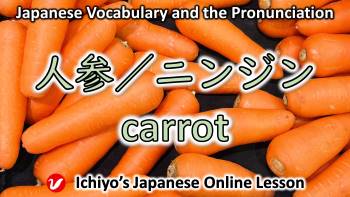The Japanese vocabulary「ニンジン (にんじん、ninjin)」means “carrot.” Please learn the pronunciation and the example sentences.
Japanese Vocabulary and the Meaning
| Key Word | 人参、ニンジン |
| Hiragana | にんじん |
| Romaji Reading | ninjin |
| English Meaning | carrot |
The Correct Japanese Pronunciations
Please learn the pronunciation by watching the attached video. You can also learn example sentences.
Our main YouTube channel: Ichiyo’s Japanese YouTube Channel
Our sub-YouTube channel (Japanese vocabulary videos): Ichiyo’s Subchannel
The Example Japanese Sentences
It is important to have skills in both non-honorific and honorific languages in order to use Japanese correctly.
I’ll prepare four carrots.
Plain Form:
ニンジンを4本用意する。
Ninjin o yon hon yōi suru.
Polite Form:
ニンジンを4本用意します。
Ninjin o yon hon yōi shimasu.
I don’t eat dishes that contain carrots.
Plain Form:
私は、人参が入っている料理は食べない。
Watashi wa, ninjin ga haitte iru ryōri wa tabenai.
Polite Form:
私は、人参が入っている料理は食べません。
Watashi wa, ninjin ga haitte iru ryōri wa tabemasen.
Carrots did not grow well this year.
Plain Form:
今年は上手くニンジンが育たなかった。
Kotoshi wa umaku ninjin ga sodata nakatta.
Polite Form:
今年は上手くニンジンが育たなかったです。
Kotoshi wa umaku ninjin ga sodata nakatta desu.
A horse ate a carrot.
Plain Form:
馬がニンジンを食べた。
Uma ga ninjin o tabeta.
Polite Form:
馬がニンジンを食べました。
Uma ga ninjin o tabemashita.
Carrots are cheap today.
Plain Form:
今日はニンジンが安い。
Kyō wa ninjin ga yasui.
Polite Form:
今日はニンジンが安いです。
Kyō wa ninjin ga yasui desu.



